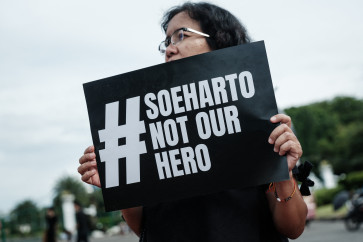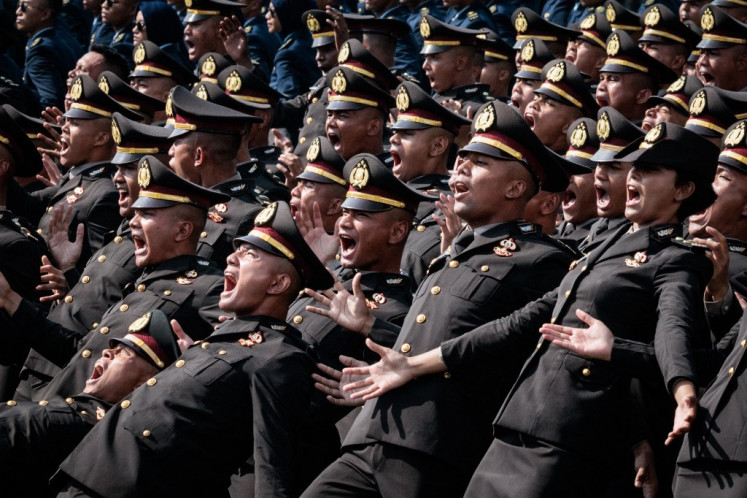Popular Reads
Top Results
Can't find what you're looking for?
View all search resultsPopular Reads
Top Results
Can't find what you're looking for?
View all search resultsJakob Tobing: Leading the nation through friendship
One of the most important achievements of Indonesia's reformation has been the amendment of the 1945 Constitution
Change text size
Gift Premium Articles
to Anyone
One of the most important achievements of Indonesia's reformation has been the amendment of the 1945 Constitution. The changes fundamentally transformed a highly centralized administration system into one which relegates authority and imposes a system of checks and balances.
Among other things, the amended Constitution mandates direct parliamentary and presidential elections, limits presidential terms in office, clearly delineates executive-legislative-judiciary branches, protects human rights and further elaborates on clauses on education and economic matters.
Prior to the amendments, the People's Consultative Assembly (MPR) had elected the president, set State Policy Guidelines (GBHN) and could impeach the president. The impeachment of former president Abdurrahman Wahid in 2001 showed the MPR's true power.
Subsequently, it came as a surprise when members of the MPR decided to restructure their own institution, and the smoothness of this change startled many observers, especially those overseas.
In the Soviet Union, for example, such fundamental changes (introduced with Perestroika and Glasnost) had split the union into many nations. Similarly, Yugoslavia and Czechoslovakia were divided in the so-called Balkanization process when they went through reformation.
This huge job was carried out by the MPR's Ad Hoc Committee (PAH I) in charge of amending the 1945 Constitution. The committee was chaired by Jakob Tobing, a soft-spoken legislator who also led the Indonesian Election Committee (PPI) in 1999.
Amidst the General Election Committee's (KPU) failure to finalize vote counts at that time, PPI played a crucial role in ensuring the success of the 1999 General Election, which is regarded as the most democratic election Indonesia had seen since 1955.
Jakob, a seasoned politician, had already served as a legislative member for 34 years. He began his career in 1968, while still at university, when he was elected as the youngest member of the so-called Gotong Royong House of Representatives (DPR-GR), representing student activists.
Together with other members of DPR-GR's Karya Pembangunan faction, Jakob founded the Golkar political party in the early 1970s.
Until President Soeharto's downfall in 1998, Golkar was Soeharto's main political vehicle and the most dominant party in Indonesia. In the early 1990s, however, long before Soeharto was forced to step down, Jakob decided to quit from the party.
"My conscience told me those ideas driving me to join and help establish this party in the early 1970s had been abandoned," said the North Sumatran in his recently published political memoir titled Berusaha Turut Melayani (Endeavoring to Serve, published by Konstitusi Press, July 2008).
For his contribution to the nation, then president Habibie awarded Jakob the first class Mahaputera Utama medal. A few years later, the South Korean government also awarded him a medal, the Ganghwa, which is the country's highest diplomatic award and is given only to selected individuals.
During his tenure as the Indonesian Ambassador to the Republic of Korea (from 2004 to 2008), Jakob managed to bridge a meeting between then South Korean prime minister Lee Hay-chan and the second most powerful man in North Korea, Kim Yong-nam, while the pair were in Jakarta.
This meeting helped release tensions between the two countries. It was followed up by the two Koreans and resulted in a summit meeting between presidents Roh Moo-hyun and Kim Jong-il in Pyongyang, in October 2007.
Recently, The Jakarta Post interviewed Jakob, who currently serves as the president of the Leimena Institute, a Jakarta-based non-profit organization for social, political and economic studies.
Question: Your previous job at the DPR obliged you to deal with heavy pressure. How did you manage this? Is it true that you lack emotion as some people have said?
When I was a child, I used to internalize problems so that people would not see the raging war within. Also, probably my habit of practicing sports and relaxation did help.
I try to find time for myself to pray intensively. This helps me feel better. I also believe many people have prayed for me as I have often had big problems that have simply disappeared.
I felt this (the power of prayer) at some crucial moments in particular, like when we debated over the format of this state. Some people wanted us to become a federation. Not many knew about this, but it was a very tense moment for me. The same goes for the moment when we debated over the 29th article of the 1945 Constitution.
Sometimes, the debate did not just attack us verbally, but also mentally, which increased the pressure on us.
In such moments, though, I could feel Divine intervention at work -- the situation didn't get out of hand.
Why was the 29th verse so heavily debated?
It is about religious freedom. I cannot accept that someone can be forced by law to go to a church or mosque. This would replace God's power with human power. However, some had different ideas. But when political interests enter in to the debate, it is difficult to have an objective deliberation.
How did you manage to lead the various factions of the MPR's Ad Hoc Committee (PAH -I) for the amendment of the 1945 Constitution?
I simply approached it as a community of friends. My experience as a student activist taught me to treat everyone as an equal. Some PAH-I members were old friends too.
The people were strongly demanding reforms. Each PAH-I member took this into account when we looked at issues.
I also believe that all of my friends in PAH-I understood the idea of reformation well. And there was also a trust, such that every one of us had a sincere respect for each other.
The different view points actually enriched our discussions and made it easier for us to complete the process. I was amazed at how smoothly it all went.
It seems friendship becomes an important aspect in diplomacy, doesn't it? I heard this was important when you became the Indonesian Ambassador to the Republic of Korea?
Indeed. Friendship eases up communication, loosens up formal barriers and generates trust. When I became Indonesian Ambassador to Korea, Ban Ki-moon was the (Korean) minister of foreign affairs.
In our first meeting, he reminded me I was his senior back at Harvard University. I learned afterwards that Confucian culture respects seniority. It helped us pave the way for a better diplomatic relationship because we were able to relate as friends.
When Ban Ki-moon was elected as the UN Secretary-General, I invited him to dine with me at his favorite Japanese restaurant near the UN building in New York, in March 2006. The UN staff were surprised because they knew he was extremely busy, but they didn't realize it was because his friend had invited him. That night we discussed East Asia at great length, including his expectation for Indonesia to help in the Korean peninsula's peace process if necessary.
Your Opinion Matters
Share your experiences, suggestions, and any issues you've encountered on The Jakarta Post. We're here to listen.
Thank you
Thank you for sharing your thoughts. We appreciate your feedback.










